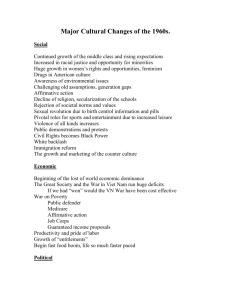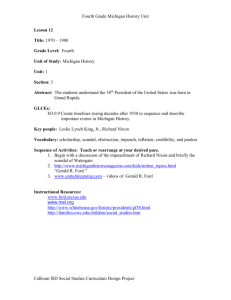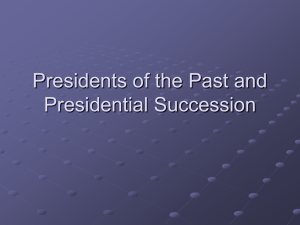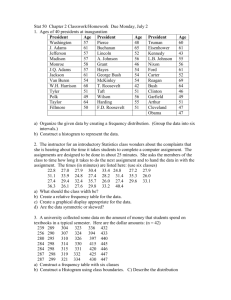Unit IV Executive Branch
advertisement
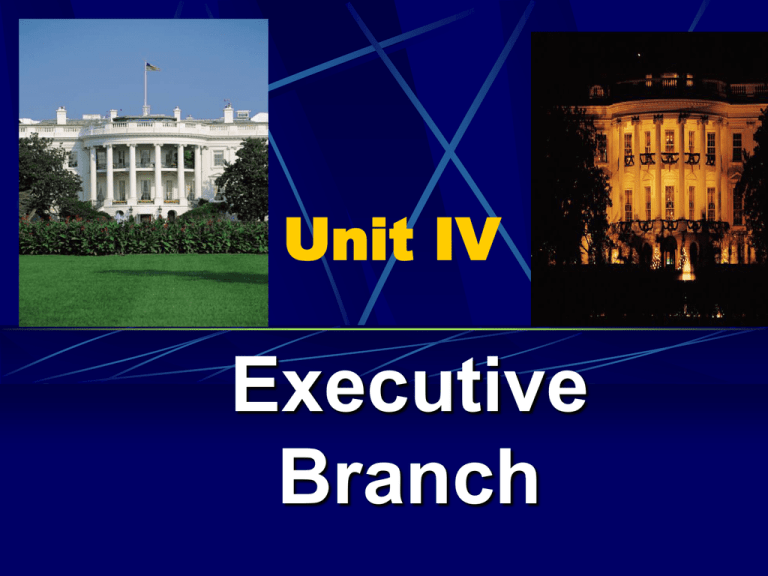
Unit IV Executive Branch I. President & Vice President A. Qualifications 1. Native Born 2. 35 yrs old 3. U.S. resident 14 yrs B. Term 1. 4 yrs 2. 2 term limit – 22nd Amendment C. Vice President 1. Take over for President 2. President of the Senate http://www.termlimits.org/Current_Info/22nd-Amendment-text.html D. Presidential Succession 1. 2. 3. 4. Vice President Speaker of the House President Pro Tempore Cabinet members (oldest to newest) E. 25th Amendment 1. If President cannot serve & Vice President takes over, he nominates new Vice President http://www.infoplease.com/ipa/A0101032.html 2. Nixon Pres. Agnew VP resigns tax evasion Nixon nominates Ford Nixon resigns (Watergate) Ford takes over & nominates Rockefeller VP http://www.watergate.info/ Nixon & Agnew Ford & Rockefeller II. Powers & Roles of the President A. Influence legislation 1. State of the Union address 2. Budget for the U.S. 3. Veto power B. Judicial Powers 1. Appoints members to Federal Courts 2. Grants pardons, reprieves C. Chief of State 1. Symbol 2. Political party leader D. Commander in Chief 1. 2. 3. 4. 5. State Dept Defense Dept Joint Chiefs of Staff CIA National Security Council E. Foreign Policy Leader 1. Military powers 2. Treaty-making powers a. Peace – Japan, Germany b. Alliance – NATO, ANZUS, OAS c. Commercial & trade – GATT protective tariff balance of trade http://www.oas.org/ http://www.awm.gov.au/korea/origins/anzus/anzus.htm http://www.nato.int/ http://www.natlaw.com/treaties.htm F. Chief Diplomat 1. Diplomacy – personal, summit conference 2. Diplomatic recognition 3. Ambassadors Pres. Ulysses S. Grant greeting a Japanese delegation in the White House March 23, 1872 III. Executive Support A. Executive Office of the President 1. Council of economic advisors 2. Office of management & budget 3. Press secretary B. Cabinet 1. Executive departments (15) 2. Secretary, attorney general C. Agencies 1.Independent a. NASA b. CIA 2.Regulatory a. FCC b. EPA c. CPSC d. Fed. Reserve Sys. Attorney General Michael B. Mukasey http://www.whitehouse.gov/government/cabinet.html IV. Debate, Consensus, Compromise, Negotiation A. Resolving conflict B. Monroe Doctrine Roosevelt Corollary, Good Neighbor Policy Both Monroe Doctrine & Good Neighbor Policy was designed to keep European influence out of Central & South America Wilson, League of Nations (WWI) Truman Doctrine – Berlin, Korea (spread of communism) Kennedy – Bay of Pigs, Cuban Missile Crisis Johnson Nixon Ford Johnson, Nixon, & Ford were tied to Vietnam Carter – Iran Hostages Reagan – Lebanon, Libya, Granada George H. W. Bush – Kuwait, Panama Clinton – Somalia, Haiti, Bosnia, Kosovo George W. Bush – Afghanistan, Iraq U.S. Presidents 1st - George Washington 4th – James Madison 2nd – John Adams 5th – James Monroe 3rd – Thomas Jefferson 6th – John Quincy Adams 7th – Andrew Jackson 8th – Martin Van Buren 9th – William H. Harrison 10th – John Tyler 11th – James K. Polk 12th – Zachary Taylor 13th – Millard Fillmore 14th – Franklin Pierce 15th – James Buchanan 16th – Abraham Lincoln 17th – Andrew Johnson 18th – Ulysses S. Grant 19th – Rutherford B. Hayes 20th – James A. Garfield 21st – Chester A. Arthur 22nd – Grover Cleveland 23rd – Benjamin Harrison 24th – Grover Cleveland 25th – William McKinley 26th – Theodore Roosevelt 27th – William H. Taft 28th – Woodrow Wilson 29th – Warren G. Harding 30th – Calvin Coolidge 31st – Herbert C. Hoover 32nd – Franklin D. Roosevelt 33rd – Harry S. Truman 34th – Dwight D. Eisenhower 35th- John F. Kennedy 36th – Lyndon B. Johnson 37th – Richard M. Nixon 38th – Gerald R. Ford 39th – James E. Carter, Jr. 40th – Ronald W. Reagan 41st – George H.W. Bush 42nd – William J. Clinton 43rd – George W. Bush 44th- Barack Obama

